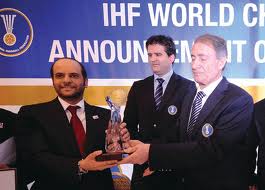I was present a year ago, when the announcement was made that the IHF Council had decided to award the hosting of the 2015 Men’s World Championship to Qatar. France had hoped to gain those rights and expressed disappointment in many ways. From one journalist came the question: “for what purpose do they want to be the host; after all, everyone knows that the countries who fight to become organizers are typically top medal contenders who want to improve their chances to win the gold by playing at home!”. I responded, half-jokingly, “do not worry, because by 2015 perhaps Qatar will have managed to acquire a strong team”.
A little bit I had in mind the habit of teams from the Middle East to make a mockery of the ‘Super Globe’, the event touted by the IHF as ‘the World Championship for clubs’, where they borrow prominent players from other clubs on short-term contracts in order to become suddenly competitive. But I was also aware that the IHF eligibility regulations allow a player to change from one national team to another, after a change in citizenship and three years of ‘quarantaine’., i.e. not playing for the former country in an official competition.
This has worked to the advantage of, for instance, Germany and Spain in recent years, when key players from Eastern Europe were naturalized. Germany and Spain do not exactly have a shortage of young, talented players who could work their way into their national teams, but there was no outcry when these actions took place. And going further back, the systematic approach of the Austrian women’s team to acquire a team full of stars from the Balkans and the former Soviet Union barely tended to cause some mild irritation or indignation, when the Austrian team became a bit ‘too strong’ through this method.
But these developments never caused an outcry from handball countries, demanding that the IHF change its regulations and prohibit such changes in eligibility, more along the lines of the strict rules of FIFA. However, now suddenly, when the issue involves Qatar, the protests can be heard. Is the situation somehow different because it involves a non-European country, moreover a country with seemingly unlimited resources to build up an image as a prominent country in the world of sports, especially through the organization of major events, including the football world championship in 2022!?
I fully appreciate that one can have different views on this special way of building a national team. But I think there needs to be some consistency. Why have there never been any complaints about this IHF regulation before, until now suddenly Qatar openly states its intention to take advantage of it in a systematic and large-scale fashion? Why were the traditional handball powers asleep or silent until now? Being European-born, I fully appreciate the strong excitement caused by the victories and defeats of the respective national teams. Even if most of the star players from around Europe play for club teams outside their ‘home’ countries almost the entire year, it is a big deal when they come and play for their country of citizenship, with flags and anthems reflecting the feelings of nationalism. But please be consistent!
We are right now at a critical moment apropos this issue. I mentioned about a three-year waiting period. This means that players taking part in the European, African or Asian Championships this month cause themselves to be ineligible to play for a another country in the early part of 2015 when the World Championship in Qatar is scheduled to take place. So when we have now seen, just as in the case of the recent Women’s World Championship, that some top players have declined participation due to sudden injuries or a lack of motivation, then the speculation is beginning. Are they perhaps instead ensuring their ability to transfer in time for 2015?? This is really creating an awkward atmosphere!
And there have even been suspicions quietly expressed to the effect that the IHF Council or Congress, both dominated by the non-Europeans, might come up with the idea to shorten the waiting period to, say, two years, thus making all the top players available for transfers even if the played in the top events this month. I will refrain from taking a view on this speculation. Instead I will say that this is one more issue where the traditional handball powers in Europe, to my taste, tend to take a very passive or naïve stance. You are entitled to protect your interests and have your views on what is fair and proper, but then you must be prepared to be proactive and handle things in a political, strategic and coordinated fashion. Indignation and uncoordinated protests is not the way to go…
